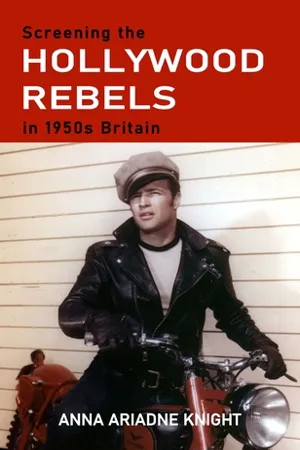1
‘Attractive and imitable’: Marlon Brando and The Wild One ban in the UK
If anything, the reaction to the picture said more about the audience than it did about the film.
Marlon Brando, Songs My Mother Taught Me, 19941
I would say let it be seen. It is so far removed from anything that could possibly happen in this country that it borders on farce.
John Watney, Sunday Dispatch, 19542
In April 1955, The Wild One, starring Marlon Brando, premiered at the Rex Cinema in Cambridge. This was no ordinary screening, since the film had recently been denied a certificate by the British Board of Film Censors (BBFC), who took the unanimous view that general exhibition would prove pernicious to the more impressionable among Britain's teenagers.3 The Wild One, which told the story of a nomadic group of law-breaking motorcyclists, arrived in Britain during a period of heightened concerns about the violent nature of Teddy boy gangs. The decision taken by the BBFC did not deter Leslie Halliwell, the manager of the Rex and an erudite film essayist. Halliwell had petitioned Cambridge magistrates to grant the film a local X certificate because he believed that Brando was ‘an actor whose every appearance is a major screen event’.4 Having received the approval of the local watch committee, Halliwell's petition met with mixed responses from other Cambridge residents. Frank Hardy, a local youth club leader, commented: ‘It's alright showing it in Cambridge. We have a low juvenile delinquency rate. But in some places it could be a harmful influence. I wouldn't show it in Liverpool, for instance.’ 5
Given the short distance between Cambridge and London, Halliwell was ‘besieged’ by requests for party rates from film enthusiasts and motorcycle clubs across the country. London sophisticates and celebrities, such as the former music hall star Beatrice Lillie and the film actor Jon Pertwee, joined Teddy boys and bikers at the much-publicised film screenings. When hordes of motorcyclists were met by Cambridge police at this small, specialist cinema in one of Britain's safest and most respectable towns, it appeared to some residents that life was beginning to imitate art. News reporters were quick to point out, however, that the police presence was intended to uphold residential parking regulations rather than contain an ‘invasion’ of revellers.
This chapter explores and illuminates this most compelling, landmark episode of film censorship and examines why the BBFC decided to ban The Wild One from general exhibition. The film's commentary on recreational violence was an obvious point of contention given the board's opinions of young, receptive cinemagoers. However, this scenario provides an incomplete and simplified version of events. The censors described Marlon Brando as ‘attractive, admirable, [and] imitable’ and I argue that this is the more persuasive and plausible reason for the film's ultimate fate.6 As a newly emerging ‘anti-star’, Brando was offering British audiences a range of meanings connotative of his tough looks, ‘unorthodox’ acting style and off-screen anti-Hollywood behaviour that had never yet been encountered in the USA or in Britain.7
In The Wild One, Brando takes the role of Johnny Strabler, the leader of the Black Rebel Motorcycle Club. The Black Rebels are disqualified from entering a rally because of anti-social behaviour and, to show their disapproval, steal a prize statuette. They mockingly award the prize to Johnny, who straps it onto his motorcycle. From there, the gang rides on to Wrightsville, so named, presumably, to suggest its ordinariness and respectability. Once there, the Black Rebels start drinking and become boisterous and unruly. The situation worsens when the Beetles, a rival gang led by Johnny's nemesis, Chino (Lee Marvin), arrive. Taunting and jeering escalate into a brawl between the arch rivals. Needless to say, Johnny wins. When a local resident attempts to drive through the fracas, his car is overturned and Chino is arrested by the local sheriff, Harry Bleeker (Robert Keith). However, the ageing Bleeker is somewhat ineffectual and lacks manpower, with the result that the gangs continue to cause havoc as the night progresses.
Johnny takes a liking to Bleeker's daughter, Kathie (Mary Murphy) and tries to persuade her to go riding with him. In the meantime, a local group of townsmen arm themselves and plan to take matters into their own hands. With phone lines cut, and a building set alight, the gangs’ antics appear to be out of control. At one point, Kathy is terrorised by a several motorcyclists and Johnny intervenes to rescue her (presumably from an attempted rape) and then tries to seduce her himself. Frustrated by her resistance and then confused by her submission, Johnny decides that he will leave town instead. Johnny rides off but is captured by vigilantes and severely beaten. When he manages to escape with Kathie's help, one of the vigilantes throws a tyre lever at his back wheel and Johnny falls off his bike. The riderless motorcycle careens into the crowd, killing an innocent bystander – a kindly old man who had been amused by the biker gangs. Johnny is picked up and detained by police. Kathie and her father, who have witnessed the events, come to Johnny's defence and explain that the killing was accidental. Johnny is exonerated and released after being issued with a warning against future misbehaviour. Moments before Johnny finally leaves town, he silently drinks a cup of coffee in the local cafe. Kathie watches him but he refuses to make eye contact with her. Without saying a word, he retrieves the (stolen) statuette from his jacket pocket and places it on the counter, pushing it toward her and leaving it there. They share an enigmatic smile; he exits.
The Wild One had been inspired by actual events that took place at the American Motorcycle Association rally in Hollister, California, in 1947, when hundreds of drunken motorcyclists overwhelmed local police. The story was then fictionalised by Frank...
